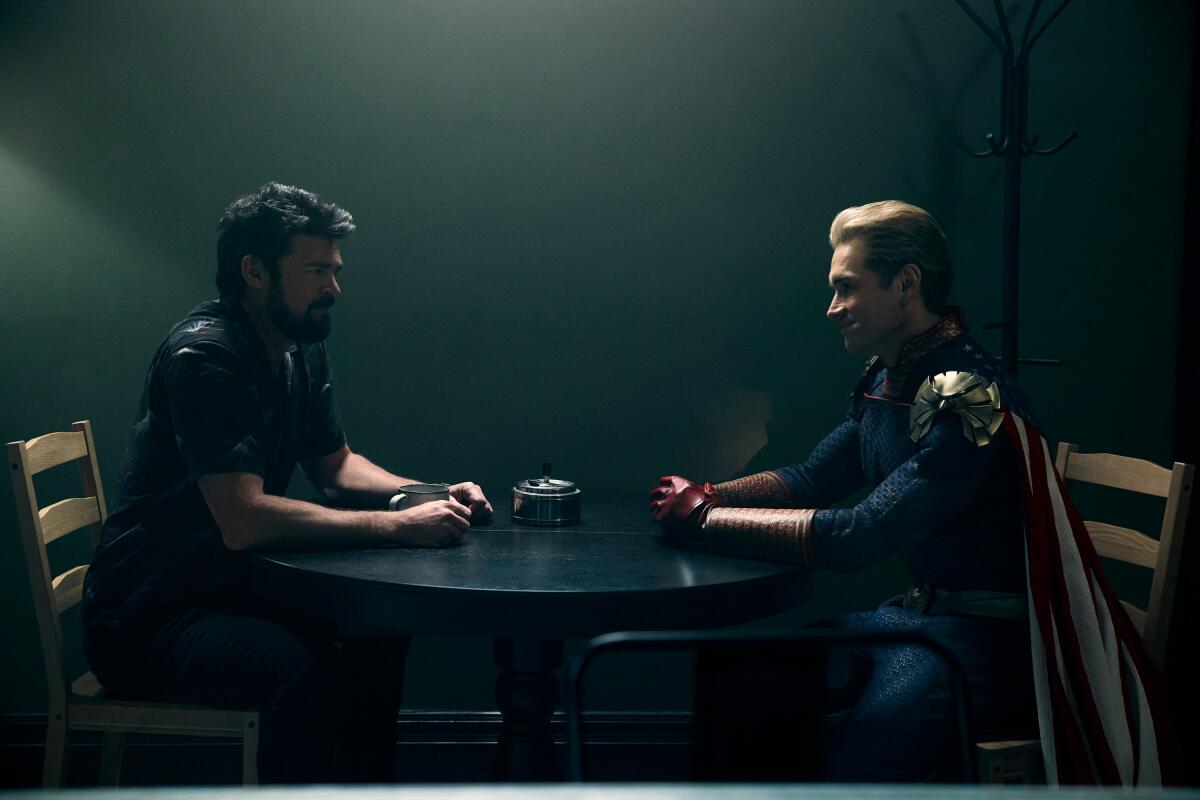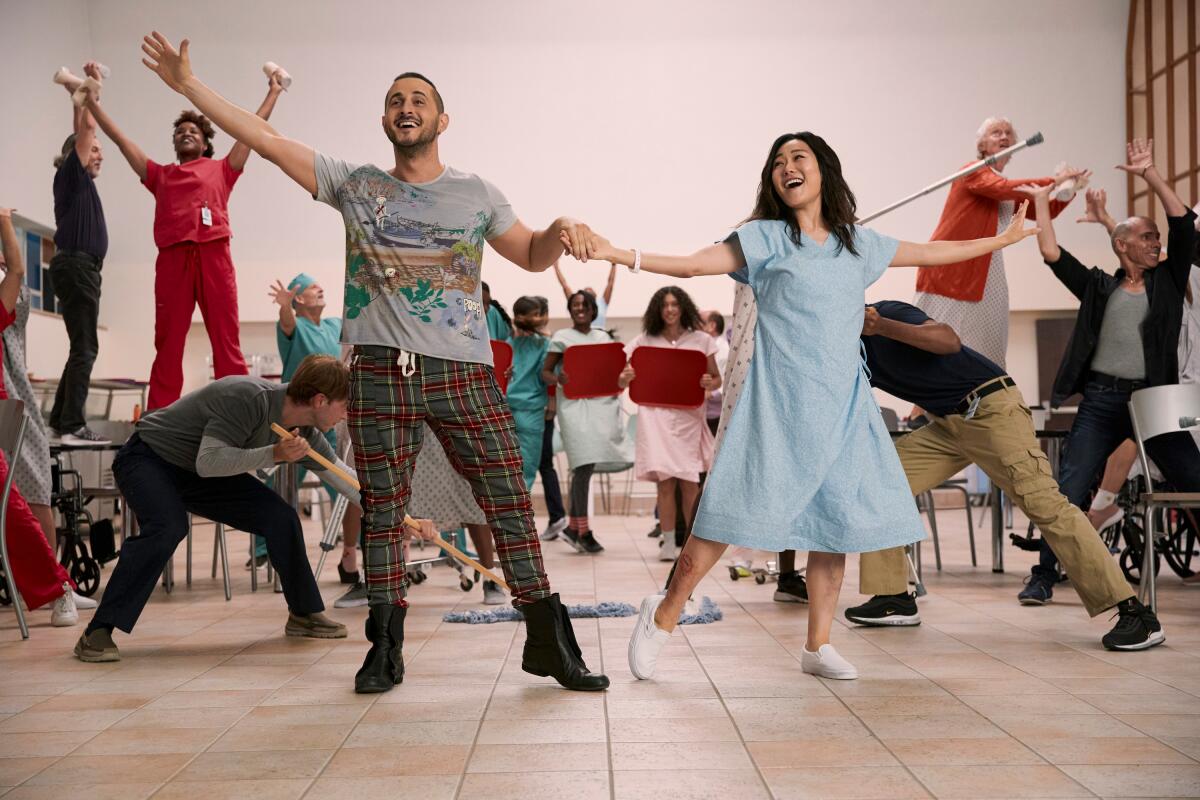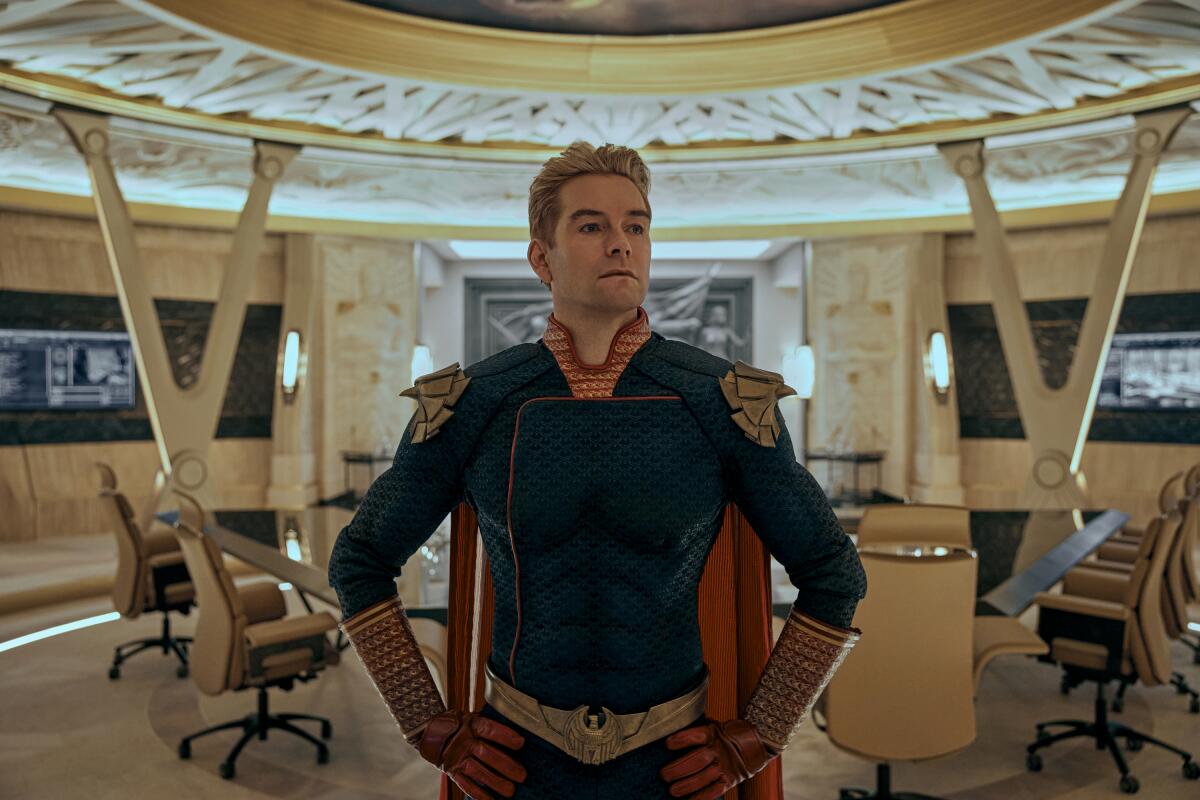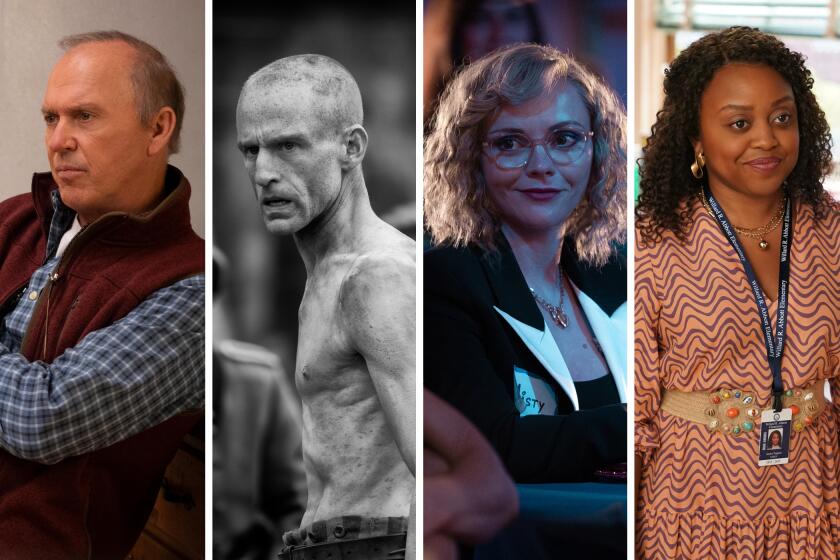‘What have I done?’: ‘The Boys’ boss explains the scene that will have you screaming

- Share via
When Eric Kripke is afraid of things, he puts them on-screen and blows them up. But the creator of “The Boys,” Amazon’s irreverent spin on the superhero genre, is not at all scared to tell you that the series at its core is a “dark satire about late-stage capitalism” and a “takedown of toxic masculinity.”
Season 3, which premiered Friday, is even wilder: a musical interlude here; a powerful racist getting, um, dragged for his actions there; an exploding penis everywhere. In a way, the excesses of “The Boys” serve as a kind of therapy, at least for those who work on it.
“The writers write what they’re passionate about, angry about or frightened of as it’s happening, which is why issues about over-policing and BLM [Black Lives Matter] and Jan. 6 are all folded into this season. We’re writing what we see,” Kripke says in a jolly Zoom chat.
The first two seasons of the twisted, “What if superheroes were sociopaths?” take on comic-book mythology were carefully metaphorical in their critique of corporate power and what Kripke derides as “bro culture,” especially in the workplace. In Season 3, that veil drops a bit as those ripped-from-the-headlines issues Kripke cites come into play — and some distinctly Trump-ian language ends up in characters’ mouths.
“That is not your imagination,” he says. “I’ll cop to being a little less elegant than maybe I have been in the past. But I’d say that the world is, every year, less elegant. It’s the same as everybody: I’m exhausted and frustrated and scared, but I’m just thankful I have a job where I can write about it. It’s good, therapeutically. In my own dumb, carny way, I can do something about it.”
We sift through the rubble of the Season 2 finale of Amazon’s “The Boys” with Aya Cash, Karen Fukuhara, Antony Starr, Karl Urban and showrunner Eric Kripke.
“The crazy stuff is on the front of the cereal box, but inside the box, we put a lot of fiber,” Kripke adds, describing his approach as a Trojan horse: “And if a giant penis is my spoonful of sugar, then so be it.”
He’s referring to a scene at the start of Season 3 as the titular, mostly nonpowered Boys, working with the government to apprehend superheroes gone bad, seek to snag the elusive Termite, an Ant-Man-style “supe” whom they’ve tracked to a bacchanal. What the debauched, insect-size Termite does for kicks involves the actor playing Termite, that “giant penis” and many viewers squirming. Then it all goes terribly, terribly wrong.
And those viewers will be screaming.
But Kripke insists that the “crawling-into-a-urethra” scene is not simply an attempt to out-gonzo previous seasons.
“We really try hard not to get into the game of ‘How do we top ourselves?’” he says. “I think that’s a trap. You’ll end up with something that’s too bloated, or more importantly, insincere. We always say, ‘Don’t go bigger; go deeper.’ In that case, literally. What new facet of the character can we reveal, or of the world? This ongoing notion of ‘What would happen if you took superpowers, which are ridiculous, and put them in the real world?’ If you had an Ant-Man power, those types of situations would ultimately happen.” He lets go a laugh.
“I think way more about how to keep ratcheting up character conflict and stakes and reveal more about who these people are. I worry about that a lot. I worry about the size of the set pieces almost never.”

The situations in this world make a kind of queasy sense: Imagine the profligacy of our own rich and powerful if they were literally bulletproof. But there are times when even those working on the show go, “Whoa.”
Kripke says, “You pitch these moments; they’re words on a page and reasonably benign. Once it’s up on its feet and you’re watching dailies, you’re covering your mouth with your hand: ‘Oh, my God. Somebody had to really do that. What have I done?’
“I think ‘Herogasm’ was a five-day shoot that people had a thousand-yard stare walking out of. It’s a lot.”
You read that right: “Herogasm,” an annual superpowered sexual get-together depicted in a forthcoming episode.
“As part of the set decoration, there are giant pump bottles of lube everywhere. You’re at an orgy, right? Then also, because of COVID, there are these giant pump bottles of hand sanitizer. Once every 10 minutes, you’d hear someone yell, ‘Damn it,’ because they’d just pumped a huge gob of lube into their hands.”
Look! Up in the sky! It’s a bunch of quality shows with superheroes in them!
All this carnal carnage has a serious purpose, though: Kripke and co. are here to bludgeon the movie-baked myth of masculinity über alles and women-as-props with the bloody cudgel of “The Boys‘” superhero mythology turned inside out.
“We got to explore this John Wayne myth of the rugged, masculine, American individual and what crap it is. Today, they call it toxic masculinity, and it truly has poisoned generations of boys in this country. There are generations of kids who cannot express their feelings because they were told it’s somehow ‘feminine’ and that there’s something wrong with being feminine,” says Kripke.
“That’s why you have millions and millions of American men trying to live up to an ideal that 1) is unachievable and 2) John Wayne never achieved it. It was made up. It was a myth, and it was always a myth. It was a terrible idea in the first place and never true ... and is now being used to manipulate people.
“That energy has created a lot of damage. Everything from Putin to the NRA to our gun culture … I was always so struck by Trump when he had recovered from COVID and had an opportunity to connect with people and assure them they were OK. But he didn’t. He walked up to the balcony of the White House and he takes off his mask,” Kripke makes the grand gesture of ripping it off, “and felt it was necessary to project machismo over compassion. You’re just like, ‘What is so broken in you, in how your father raised you, that you felt the need to front as powerful?’”

The point is never clearer than in the show’s depiction of its Übermensch, Homelander. Previously kept in check by his desperate need for approval — people would presumably love him less if they witnessed him callously letting hundreds die or killing anyone he pleased — in Season 3, he learns a very contemporary lesson: The worse he gets, the more his base loves him.
Kripke says of the actor who brilliantly embodies the not-so-fun-house Superman, “Antony Starr and I talk all the time about Homelander as the weakest character on the show. He’s so openly, nakedly needy, like a certain former president. He gauges how his day goes by how many people love him. It’s so pathetic.
“One thing I find hard to understand about Trumpism is how the most powerful man on the planet could present himself as a victim all the time, and millions and millions and millions of people bought it. His horrific genius is tapping into their feelings of victimization.”
With this at the top of his mind, even the most eye-popping set piece becomes a puckish way of speaking truth to power — like a very, very elaborate prank.
“The sequence with Termite — that’s a really challenging sequence, logistically,” says Kripke. “I’m proud to say we built that penis practically. That is an 11-foot-high, 20-foot-long penis. Built at incredible expense. Then VFX sweetened it and, excuse the pun, skinned it over.
“When I’m at the studio and this massive thing is built,” he says, “and I got to spend Sony and Amazon’s money on it ... you just feel like you have the best job in the world. We always feel like we’re getting away with something: ‘When are they going to catch us?’”
Our panel of veteran TV journalists predicts the winners in 14 categories of the 2022 Emmys. Now you can make your picks in all the categories.
‘The Boys’
Where: Amazon Prime
When: Any time
Rating: 18+
More to Read
The complete guide to home viewing
Get Screen Gab for everything about the TV shows and streaming movies everyone’s talking about.
You may occasionally receive promotional content from the Los Angeles Times.








